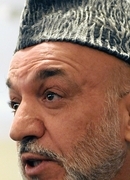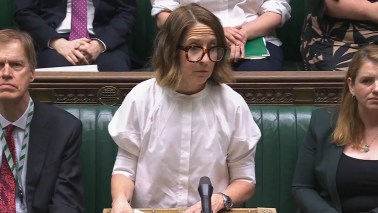Kabul
 Hamid Karzai has been steadily losing international support. It started last year when the Afghan leader scuppered the appointment of Paddy Ashdown to head the UN operation in Afghanistan. Then came a few choice leaks from Richard Holbrooke, criticizing Karzai, while Vice-President Joe Biden is said to have stormed out of a meting with the Afghan president. Visibly shaken, Karzai became more erratic and paranoid.
Hamid Karzai has been steadily losing international support. It started last year when the Afghan leader scuppered the appointment of Paddy Ashdown to head the UN operation in Afghanistan. Then came a few choice leaks from Richard Holbrooke, criticizing Karzai, while Vice-President Joe Biden is said to have stormed out of a meting with the Afghan president. Visibly shaken, Karzai became more erratic and paranoid.
But the mood in Kabul today is now completely different. In a few weeks the wily Karzai has managed to turn the tables. He has outmanoeuvred the opposition, who had demanded his resignation when his mandate runs out (there is a gap between the end of his term and the elections). Those people thought likely to run against him – like Zal Khalizad, Ashraf Ghani and Ali Jalali – have not come forward yet. (Many of them are preparing a run while simultaneously negotiating with Karzai for a place on his election ticket.)
Karzai has also skilfully exploited the discontent caused by NATO air strikes that have killed civilians. (Remember, though, that the insurgency kills more than 8000 people every year – something the Afghan government rarely condemns with the same passion).
Nobody in the international community wants Karzai to stay on; international officials sigh with despair when asked about the prospect. But fearing an upsurge in violence over the summer and in the run-up to election season, the same officials have been calling for ‘continuity’ and ‘stability’ – words that most Afghan voters have taken to mean that Karzai continues to have American support. To many Afghans this alone is enough to vote for Karzai or to abstain altogether. And with the Obama administration reviewing its Afghan policy, nobody in Washington has taken a different stance.
This is a shame. Hamid Karzai has been a crucial transitional figure. He deserves credit and a place in history. But Karzai is more like Polish resistance leader Lech Walesa than Nelson Mandela. He was crucial for the country’s transition – indeed he was the only leadership candidate acceptable to all the parties at the Bonn conference – but is incapable of governing effectively. He should be given a graceful way out, sworn to a commitment of post-election constitutional change or forced to stand aside while he runs for office.






Comments